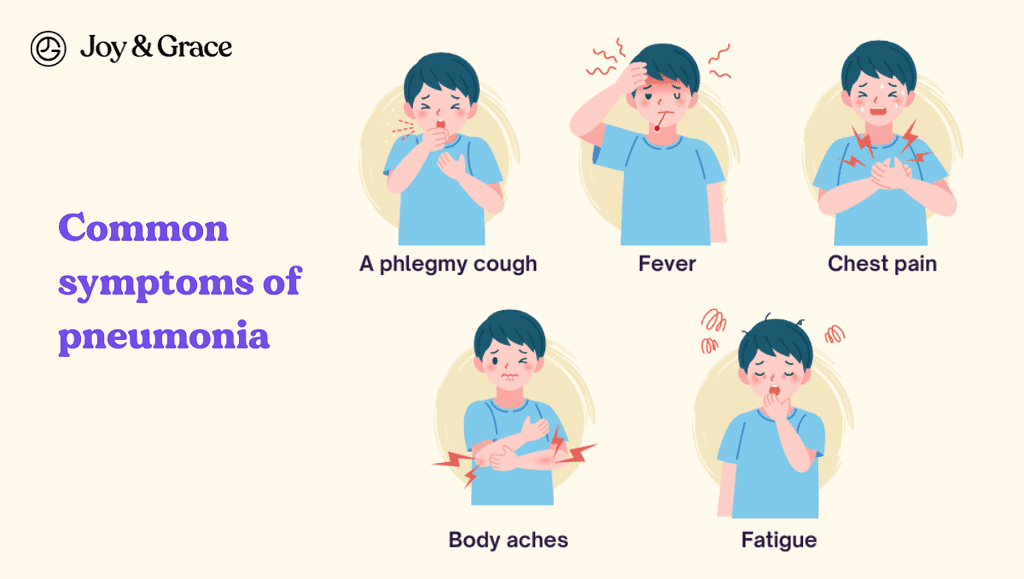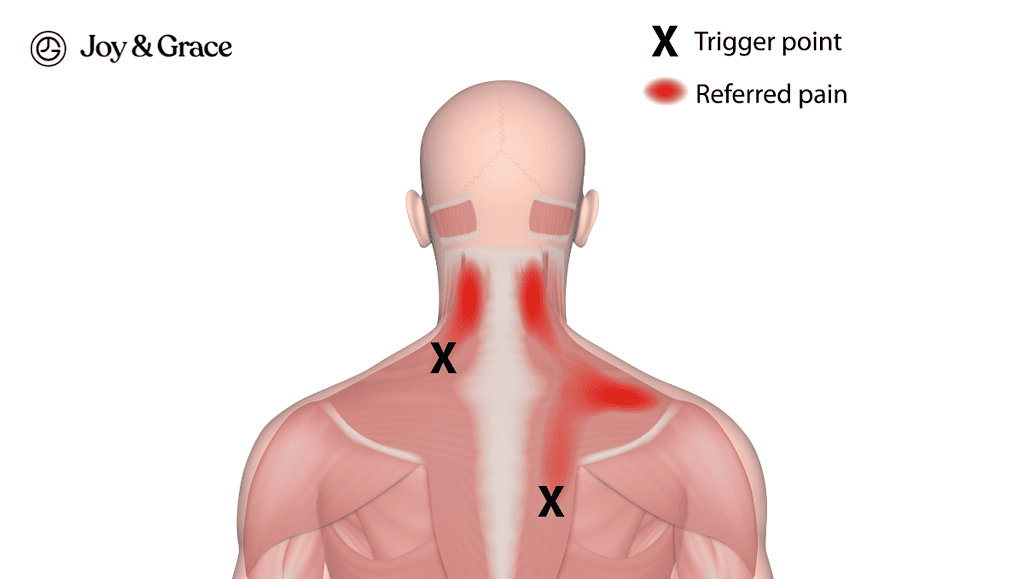Almost everyone can experience neck pain at some point in their lives. While in most cases, it is a result of strained muscles and injury, it can also be a symptom of a lung infection called pneumonia. And with the recent pandemic, you can’t help but wonder if your daily neck pain could be due to this infection.
We've gathered information from articles and journals to help you uncover the link between pneumonia and neck pain.
Can Pneumonia Cause Neck Pain?

Pneumonia is a lung infection that can be due to a variety of microbes, including bacteria, fungi, and viruses. The symptoms of this nasty infection can vary from person to person. Common symptoms include:
- Fever
- A phlegmy cough
- Fatigue
- Chest pain
- Body aches
Although neck pain can be common in some forms of pneumonia, like viral pneumonia and COVID-19, it is usually only a result of “referred pain." It can also be a result of a complication due to untreated pneumonia.
So what is "referred pain"? It’s when you feel pain in an area of your body different from the original site of injury or inflammation.
For example, imagine you have chest pain. This chest pain can travel to other areas of your body, like your neck, shoulders, and back. You’ll see how this relates to pneumonia as you read on.
Does Pneumonia Affect Your Neck And Back?
When your body is busy fighting off pneumonia, your immune system releases cytokines and interleukins. These proteins cause inflammation and recruit white blood cells to fight the little but nasty & potent invaders.
But inflammation can also affect your body's healthy tissues and may be why you can have back and neck pain when you have pneumonia. This is especially true for viral pneumonia.
This inflammation can also irritate the lining of your lungs, called the pleura. This leads to a painful condition called pleurisy.
But the lungs don’t have pain receptors, so how can it cause body pain? When you have pleurisy, the inflamed pleura can irritate nearby nerves and cause a sharp pain in the chest.
This sharp pain can become more painful when you take deep breaths. And remember referred pain? Well, the nerves in your chest are also interconnected with the nerves of your neck, back, and shoulders, causing the pain to travel to these areas.
Can Pneumonia Cause Neck And Shoulder Pain?

As mentioned earlier, pneumonia can cause pleurisy that may lead to neck and shoulder pain. But there are other ways pneumonia can cause a painful neck and shoulder. For example, when you have severe pneumonia, your lungs can no longer provide an adequate supply of oxygen to your body. This leads to a condition called “acute respiratory distress syndrome.”
The act of breathing is supposed to be a walk in the park for your body. However, in acute respiratory distress syndrome, it becomes challenging work and results in low oxygen levels. When you’re in this state, your body tries to compensate for the decreased oxygen levels by recruiting more muscles into breathing. These muscles, called accessory muscles, include the muscles of your neck.
Now, breathing is an uncommon job for your neck muscles and can cause them to strain. This strain can result in pain and weakness in your neck. It may even result in what is called torticollis, which literally means a twisted neck.
When you have torticollis, your neck twists in an abnormal position, making it hard for you to move your neck. This can result in severe neck pain, stiffness, and even shoulder pain.
Can COVID Pneumonia Cause Neck Pain?
According to a 2020 study, up to 62.5% of people infected with COVID had muscle pain and soreness, and up to 15% had joint pain.
Like other forms of pneumonia, COVID pneumonia can also have a wide range of symptoms. What’s interesting, though, is that body pain is a prominent symptom of COVID-19 infection and can even appear before other symptoms. In fact, neck pain and back pain were the initial symptoms of a large number of patients, according to studies.
The COVID-19 virus causes an extreme form of inflammation that can result in joint pain, muscle pain, and even blood clots. All these can result in neck pain. Aside from inflammation, the virus can also attach directly to receptors in your muscles, causing muscle pain and soreness. We have an article on how to relieve neck muscle pain here, if you're interested.
And like other types of infectious pneumonia, COVID pneumonia can lead to complications that cause neck pain.
What Are The Complications of Pneumonia That Can Cause Neck Pain?
Even though pneumonia is a lung infection, the bacteria and viruses may wreak havoc in other parts of your body. The most serious form is bacterial pneumonia, which can lead to life-threatening complications. Some of which can present as neck pain.
A perfect example is meningitis. This is more common in pneumonia caused by bacteria, especially Streptococcus pneumoniae. Meningitis is the inflammation of the meninges, which are the coverings of your spinal cord and brain. They can cause intense neck pain, stiffness, and headaches when inflamed.
Pneumonia can also increase your risk of having a heart attack.
“The inflammatory response in the body during an infection can increase the risk of a cardiovascular event, but there is some evidence that pneumonia specifically can contribute to plaque breaking off the artery walls and causing a clot which can lead to a heart attack.”
- Dr. Weston Harkness, DO, a cardiology fellow at Samaritan Cardiology - Corvallis.
And while we often relate heart attacks to a crushing or squeezing pain in the chest, the pain can commonly travel to the neck, back, and shoulders.
What Can Help With Neck Pain Caused By Pneumonia?

Neck pain caused by pneumonia usually resolves once you have recovered from the infection. Yet, in some cases, like COVID-19, you may still feel pain weeks and even months after you fight off the infection.
For bacterial pneumonia, your doctor usually prescribes antibiotics to fight off the infection. While in most cases of viral pneumonia, the infection usually resolves on its own, your doctor may also prescribe antivirals.
You can also do the following at home to help ease your symptoms:
- Rest. Having enough rest is essential in fighting off any infection. Aside from giving your immune system the help it needs to fight nasty invaders, it also helps your body to heal.
- Adequate nutrition and hydration. Drinking plenty of fluids and getting the right amount of nutrients can also help your body’s own defense system to fight off the infection.
- Ice packs and Warm Compress. Putting a cool ice pack on your neck may help ease the pain by reducing inflammation. A warm compress can also help soothe your neck pain by relaxing tense muscles.
If you decide to go on the warmer route, we have our own heating pad packed with aromatic herbs to help you relax and soothe your aching neck.
- Anti-Inflammatory Medication. You can also take medications like acetaminophen (Tylenol) or ibuprofen (Advil) to ease the pain.
How Do I Prevent Getting Pneumonia?

Some simple actions you can take may help protect you from catching pneumonia (and the possible neck pain). These include:
- Frequent hand washing, especially after being out in public,
- Keeping a safe distance from people you know are ill
- Consider quitting smoking and vaping to help stop further damage to your lungs. These activities can increase your chances of developing lung diseases and infections.
You can also take extra precautions to help reduce your risk of getting pneumonia even more. This includes getting vaccinations against the microbes responsible for pneumonia.
The available vaccines that can help protect you against pneumonia include:
- Your annual influenza shots
- COVID-19 vaccines
- Pneumococcal vaccines. This is very important if you are over the age of 65, have other health conditions, or partake in smoking.
When To Call Your Doctor?
Pneumonia is unlike your ordinary cold. It is a very serious lung infection that should not be ignored. It is always better to be on the safe side and seek medical attention, as pneumonia can lead to deadly complications.
Since it can progress quickly, consider calling your doctor when you are experiencing the following:
- Difficulty breathing
- Chest heaviness
- Bluish lips and fingernails
- A cough that is getting worse
- Blood tinged phlegm
- Severe neck pain and stiffness
- An extremely high fever
Also, consider seeking medical attention right away if you are:
- Over 65 years old
- Have other health conditions such as asthma, heart disease, and COPD
- Have a weakened immune system
If you fall under any of these groups, you are considered to be a high-risk individual, and pneumonia can be fatal.
Takeaway
Neck pain can be common in some types of pneumonia or only result from complications in others. While it can be a symptom, it is usually accompanied by other more common manifestations like fever, cough, and fatigue.
Neck pain, and body pain in general, is usually a result of your body’s reaction to infectious invaders. And once your body fights off these invaders, the neck pain can quickly disappear too.
Following some simple precautions and getting vaccinated can help protect you from pneumonia.















